fourth quarter and annual results 2008
Key points full year 2008
- The integration of Randstad and Vedior, creating the world's 2nd largest HR services provider, is progressing well
- Pro forma1 revenue amounted to € 17.2 billion (pro forma organic growth2 amounted to -2%)
- Pro forma EBITA3 margin remained strong at 4.9% (vs. 5.1%), pro forma EBITA reached € 834 million (-8%)
- Net profit amounted to € 18 million; including a Vedior-related non-cash goodwill impairment of € 500 million
- Adjusted4 net income attributable to ordinary shareholders increased by 18% to € 478 million
- Given difficult and very uncertain markets it is proposed to strengthen the balance sheet and not to pay dividend
Key points Q4 2008
- Revenue decline accelerated; the organic decline amounted to 14% in Q4 2008 and 18% in December 2008
- Quick cost adjustment; operating expenses amounted to € 641 million (-9% yoy and -4% vs. last quarter)
- Pro forma EBITA amounted to € 178 million (-32%); the EBITA margin reached 4.5% versus 5.7% in Q4 2007
- Solid cash generation; net debt improved by € 248 million to € 1.6 billion, leverage ratio improved to 1.8
"From an operational point of view, progress in 2008 has been excellent. Our integration process is well on track", says Ben Noteboom, CEO Randstad Holding. "However, having grown in the first half of 2008, the unprecedented fall in demand in Q4 2008 and January 2009 reflects the major economic difficulties our clients currently face. It is good to see governments and regulators acting to protect major industrial sectors, and associated employment. However, the effects will only be visible in the longer term. Meanwhile we have taken the required measures to adjust our cost base although we regret to let valuable people go. We are ready to take more measures if required, whilst ensuring to remain present in any markets with long-term potential. While current volume is down, the long-term prospects in our business are sound. Our people are focusing on what they can control: excellent service to our clients and candidates. We have all the ingredients to emerge from the current downturn stronger than ever."
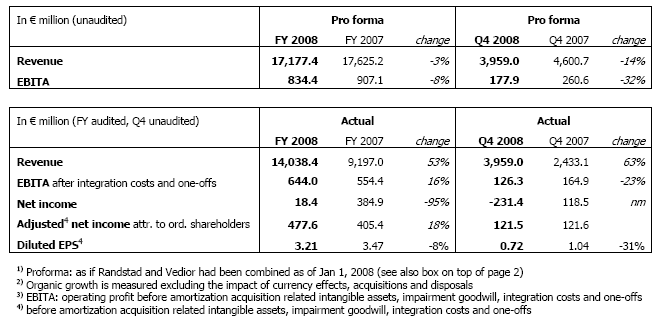
Summary of Group financial performance

Revenue
In 2008, revenue amounted to € 17.2 billion, 3% less than in 2007. The organic decrease amounted to 2%. We started the year positively, with 5% organic revenue growth in Q1 2008. In the summer, Group revenue started to decline, leading to a 2% organic decline in Q3. The aggravation of the financial crisis clearly impacted all our end markets as of September. Reduced consumer confidence, lower availability of credit and the need to lower inventories have caused reduced demand among our industrial clients as well as in the white collar and professionals segments.
Revenue decreased 14% organically in Q4 2008, hitting minus 18% in December 2008. We have a clear focus on profitability and integration while continuing to focus on market opportunities as well. Growth was maintained in emerging markets such as Asia and Latin America as well as in segments like education and healthcare. In staffing revenue contracted 14% organically; in inhouse services, with large industrial exposure, the decrease amounted to 21%, while in the professionals segment revenue decreased 6% organically. Permanent placement fees declined by 17% organically, with perm fees being 2.1% of revenue and 10.1% of gross profit (10.9% in Q4 2007).
Revenue is coming down quickly, but this does not change the positive long-term perspectives of our industry. Our clients are using labor flexibility in order to adjust to the current market circumstances. That is exactly one of the areas where our services add value. Where we partner with our clients to help them scale down in adverse market circumstances, the chance is high that usage of our services will grow in the next upturn. The strategic flexible layer in the workforce is expected to gain further importance to the benefit of the entire HR services industry.
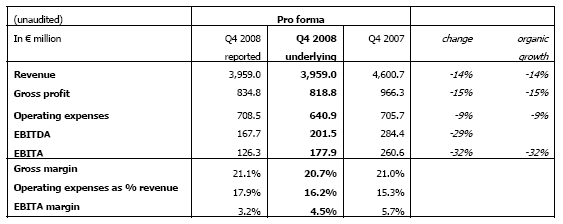
Gross profit
For the full year gross profit amounted to € 3,540.0 million, with the gross margin flat at 20.6%. The underlying gross margin increased somewhat in the first half of the year, based on strong pricing and continued growth in permanent placement fees. The latter reversed in the second half of the year.
In Q4 2008 gross profit amounted to € 834.8 million. This amount includes one-offs for a total of € 16 million, including an earlier announced social security related gain of € 20 million in the Netherlands and a charge of € 4 million relating to further streamlining of projects in our German engineering portfolio. Excluding these one-offs the gross margin reached 20.7%, compared to 21.0% in Q4 2007. The temp margin decreased by about 0.1% while the reduction in perm fees had a negative effect of about 0.2%.
Operating expenses
During the year we have swiftly adjusted our cost structure, in reaction to the decelerating markets. In the first half of the year operating expenses grew in line with increased volumes. However, for the full year underlying operating expenses amounted to € 2,705.6 million, 1% lower than in 2007 as costs were reduced in the second half of 2008.
In Q4 2008 the underlying operating expenses amounted to € 640.9 million, 9% lower than in Q4 2007 (6% lower in constant currencies) and down 4% sequentially. Total operating expenses amounted to € 708.5 million. The reported operating expenses have been adjusted for a total of € 67.6 million. The adjustments comprise integration costs of € 23 million, a software impairment of € 13.6 million (see paragraph impairment) and restructuring charges of € 31 million. As the markets decelerated through the quarter we have initiated more restructuring projects across our operations than anticipated at the end of Q3 2008 (see paragraph restructuring). Merger related cost synergies amounted to approximately € 15 million in Q4 2008, compared with € 7 million in Q3 2008 (for detail see paragraph integration & rebranding update).
At the end of the quarter we operated a network of 5,233 branches, 6% less than in the previous quarter and 3% lower than at the end of 2007. During the quarter we employed on average 33,390 FTE, reflecting a 4% reduction versus the previous quarter and a reduction of 5% year on year.
Impairment
According to IFRS the goodwill paid for Vedior has to be allocated to segments following the management structure, in our case geographic regions. Based on the provisional allocation of goodwill and the pace of revenue decline in several regions, such as Iberia, the UK and France, goodwill had to be impaired for an amount of € 500 million in Q4 2008. For the full year impairments totaled € 585 million as we took an impairment of € 85 million on our Dutch payroll processing business, spread over Q3 2008 (€ 50 million) and Q4 2008 (€ 35 million, consisting of € 21.5 million intangibles and € 13.6 million software).
EBITA
For the full year underlying combined EBITA decreased organically by 9% to € 834.4 million. The EBITA margin remained strong at around 5% (4.9% in 2008 versus 5.1% in 2007). In Q4 2008 underlying EBITA came down by 32% to € 177.9 million, with the margin reaching 4.5% compared to 5.7% in Q4 2007.
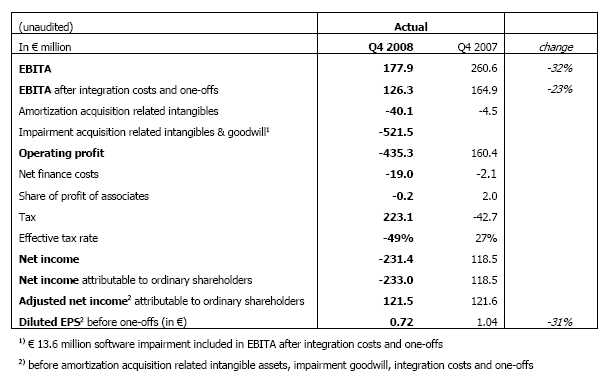
Net finance costs
For the full year, net finance costs amounted to € 71.7 million, compared to € 2.1 million in 2007. In Q4 2008, net finance costs reached € 19.0 million versus € 1.2 million in Q4 2007. This increase mainly results from the 5 year syndicated loan we use for the partial debt financing of the Vedior acquisition. The net finance costs in Q4 2008 were some 40% lower than in Q3 2008, amongst others resulting from a reduction in net debt and from the reduction in interest rates. Our policy to use floating rates as a natural hedge has been paying off this quarter.
Tax
In 2008, the underlying effective tax rate amounted to approximately 27%. The reported effective tax rate amounted to -114%, influenced by tax synergies of about € 15 million, goodwill impairment and one-off releases in Q4 2008. Excluding these effects the effective tax rate would have been 27% in Q4 2008 as well.
In Q4 2008, the merger and subsequent legal and operational integration impacted our tax position. In October 2008, Randstad US and Vedior US have been legally combined. As a consequence all future US taxable profits (including those of the more profitable Vedior assets) can be used to off-set the existing tax loss carry forward position of Randstad US. This resulted in a reduction of the valuation allowance on the US tax assets of € 40 million, which is recorded as a net gain.
Furthermore, following legal and operational restructuring after the merger, the recapture obligation that resulted out of US losses that have been deducted from Dutch fiscal profits have been re-assessed. Payback now depends on eventual dividends from the US operations to be received in the Netherlands, rather than on US profits. The different mechanism and changed time horizon resulted in a one-off release, or net gain, of € 186 million.
Net income & EPS
In 2008, adjusted net income attributable to ordinary shareholders increased by 18% to € 477.6 million (€ 405.4 million in 2007). As the average diluted number of ordinary shares increased, diluted EPS decreased by 8% to € 3.21 (2007 € 3.47). Net income amounted to € 18.4 million, as heavily influenced by the impairments.
In Q4 2008, diluted EPS decreased by 31% to € 0.72 (2007 € 1.04). Due to the impairments we recorded a net loss of € 231.4 million in the quarter.
Cash flow
Over the full year free cash flow was strong and amounted to € 672.7 million compared to € 328.4 million in 2007.
In Q4 2008, the free cash flow improved and amounted to € 280.3 million compared to € 138.5 million in Q4 2007. This improvement includes higher actual EBITA, an improvement in the moving average of DSO (days sales outstanding) from over 60 days to 59 days and the usual unwinding of working capital in case of a revenue decrease.
Balance sheet
The leverage ratio (net debt/pro forma EBITDA over the past 4 quarters) amounted to 1.8 at the end of Q4 2008. This is in line with our target of achieving a leverage ratio of at or below 2.0 within 12 months after closing the deal. The net debt position amounted to € 1,641.0 million compared to € 1,889.0 million at the end of Q3 2008 and € 144.2 million as at December 31, 2007. Refinancing of the syndicated loan is only scheduled for 2013.
The balance sheet total has expanded from € 3.3 billion at the end of Q4 2007 to € 7.7 billion by the end of Q4 2008, reflecting the consideration paid for Vedior as well as the inclusion of Vedior's asset base. On the asset side of the balance sheet, the acquisition of Vedior had a major impact on the intangible assets and the trade and other receivables. On the equity and liabilities side, the mixed cash and share offer resulted in a significant increase in Group equity as well as in borrowings.
Fourth quarter 2008 by geography
France
The French market slowed significantly during the quarter and our revenue decreased by 19% (-24% in December). Staffing and inhouse services have been affected by reduced demand in the industrial sector (including capital goods and automotive) while the clerical sector has now weakened as well. In professionals, growth continued in the healthcare segment. Permanent placement fees grew by 19%, but slowed by the end of the year. The EBITA margin improved somewhat from 4.0% to 4.4%, helped by the release of bonus accruals and social security refunds relating to the first 9 months of the year. Excluding these items the EBITA would have declined by 25% with the EBITA margin reaching 3.7%. In February 2009, the French Competition Council imposed a fine of € 18.2 million on Vediorbis in relation to a competition investigation dating back to 2004. We had a provision in place for this investigation.
The Netherlands
The integrations of Vedior Netherlands and Tempo-Team as well as Dactylo and Randstad were completed with no loss of market share. In line with the market, revenue declined by 8% with both staffing and inhouse revenue under pressure. The professionals segment continued to grow. Pricing remained healthy across the board. EBITA was maintained at a strong level. The EBITA margin reached 9.4%, compared to 9.6% in Q4 2007. Chris Heutink, who was already a member of the management team, has been appointed as general manager of Randstad the Netherlands, succeeding Jan Vermeulen.
Germany
The German business decelerated. The staffing market is young and developing structurally, but, like in France, automotive and capital goods are important sectors in the local industry and demand has slowed down fast. Revenue contracted by 14% organically, including a 20% decline in December. The organization is adapting quickly. The idle time accounts are proving effective but due to the speed of the decline we incurred € 5 million in temp related severance charges by the end of the quarter, included in regular cost of services. In combination with reduced operating leverage the EBITA margin has been under pressure and reached 4.7% compared to 8.9% in Q4 2007.
UK
On an organic basis revenue declined 16% in the UK. The merger of Randstad and Select has proven successful but demand for staffing and inhouse services remained weak. The decline in professionals became more pronounced. Growth was generated in segments such as education and healthcare, while IT, finance/accounting and engineering were under pressure. Permanent placement fees were down 18%. In professionals, additional savings measures have been initiated in Q4 2008, to show effect as of January 2009. Based on lower productivity, the EBITA margin amounted to 2.5%, compared to 4.3% in Q4 2007.
Belgium/Luxembourg
Revenue in Belgium/Luxembourg came down by 12% organically. Market growth continued to slow, especially in the important industrial segment. The rebranding process of Vedior Belgium into Tempo-Team has been completed, with the build-up of brand recognition ahead of plan. The set up of a shared service center and the roll-out of a new front and back office system are planned for H1 2009. Operating results continued to be strong with the EBITA margin reaching 5.8%, compared to 6.4% in Q4 2007.
Iberia
Revenue decreased by 21% organically, backed by continued strong performance (high single digit growth) of the Select and Vedior businesses in Portugal. The Spanish staffing market is hit hardest in Europe and showed a decline of over 30%. Next to preparation for the integration there is a strong focus on productivity management. In a very difficult environment the EBITA margin arrived at 2.8% compared to 3.4% in Q4 2007.
Other European countries
Revenue decreased by 15% organically. Growth was maintained in smaller or young operations such as in Hungary, Turkey, Greece and Cyprus. However, the larger markets such as Italy, Switzerland and Poland showed double-digit declines in the wake of the economic downturn, putting pressure on the operating result.
North America
Revenue declined by 18% on an organic basis, mostly because of the decline in general staffing. Demand for staffing remained low while inhouse services was still impacted by lower revenue per client and decreased demand; new clients ramp up slowly. In professionals overall revenue was stable through Q3, but declined towards the end of the year. Good performance was maintained in IT, healthcare and engineering, whilst finance/accounting and legal showed declines. US permanent placement fees declined 33%. The Canadian operations started to contract towards the end of the year as well. The EBITA margin came down to 3.0% from 4.1%.
Rest of the world
Growth continued to be strong across our larger businesses in Latin America such as Mexico, Argentina and Chile. We also generated continued growth in the Emirates and in Asia. Within Asia especially China and India continued to be strong. In Australia staffing revenue was about flat, whilst permanent placement fees dropped 35%.
Fourth quarter 2008 by segment
Staffing
Staffing revenue declined by 14% organically, as end markets worsened through the quarter. Among the large markets Spain, France and the UK were the weakest, followed by Germany. The Netherlands held up a bit better.
Inhouse services
On an organic basis, revenue was down 21%. Inhouse services continued to do well relative to the sectors in which it is active, such as industrial and logistics, due to client wins and start ups in new areas. However, on average revenue per client has decreased quickly.
Professionals
In professionals growth was maintained in the first 3 quarters of the year, but revenue decreased organically by 6% in Q4 2008, including stronger declines in permanent placement. Growth was maintained in segments such as healthcare and education, which are less influenced by the economy. In the US engineering continued to grow while IT was about flat. Finance/accounting was weak in Anglo-Saxon markets. Pricing continues to be good across the board.
M&A
In November 2008, we purchased a 10% stake in the share capital of Japanese Fujistaff for an amount of approx. € 12 million. Fujistaff ranks number 6 in the Japanese staffing market. In the fiscal year ending March 2008, Fujistaff generated revenue of about € 700 million. In streamlining our Japanese operations, we sold our 62% stake in Japanese Supernurse to the founder for an amount of approximately € 8 million in January 2009. We exited Finland by divesting Capsil Oy and the assets of Select Finland.
Integration and rebranding update
The integration is on schedule and is progressing well. The holding head offices were integrated in the second week of July 2008. In the UK, the Randstad head office has been integrated into the Select head office in Luton and the staffing businesses have been combined under the Randstad brand. In the Netherlands, the Tempo-Team and Vedior integration is completed, including rebranding and a switch of Vedior Netherlands to the Dutch IT platform within Q3 2008. The integration of Randstad Netherlands and Dactylo followed the same path, with the IT switch completed in October 2008. The Swiss businesses have been integrated under the Randstad brand. In India the staffing and payrolling businesses of Team4U and Ma Foi are combined to operate under the Randstad brand as of May 2009. As planned, the integration in Spain, Italy and France has commenced early 2009.
The rebranding of Vedior Belgium to Tempo-Team has been completed, while we initiated rebranding and subsequent introduction of the Randstad brand in Greece, Cyprus, Czech Republic, Slovakia and Singapore. The same is planned for Australia, New Zealand, Malaysia and Mexico as of April 1, 2009.
In order to preserve the value of the professionals businesses, we have decided not to make radical changes. The professionals businesses will mostly keep the existing brands, rebranding will only occur if opportune. However, in consultation with the major operating companies, the basics of a new professionals house style have been developed. Ultimately by the end of 2009, all professionals businesses should have the look & feel of this new Randstad Professionals brand family, while the brands will also be endorsed by the tagline 'a Randstad company'. As a result we expect meaningful annual marketing savings.
Synergies & integration costs
Synergies stemming from the Vedior acquisition are realized ahead of schedule. In 2008 synergies amounted to € 22 million, with € 7 million in Q3 and € 15 million in Q4 (the rolling € 7 million from Q3 2008 plus additional savings of € 8 million in the quarter), mostly based on Holding, the Netherlands and the UK. The savings run rate thus amounted to 65% in Q4 2008, ahead of our target to reach at least 30-40% of the € 90 million of annual run rate pre-tax synergies by the end of 2008. Whereas the target was to reach at least a 75% savings run rate by the end of 2009, we now expect to reach a 100% run rate, or € 22.5 million saving per quarter, by Q3 2009.
The recurring additional cash tax savings are being realized as planned as well. In Q4 2008 the positive impact was € 9-10 million, and due to the status of corporate restructurings up to December 31st, 2008 we will realize the full amount of approximately € 40 million in 2009.
The cash one-off integration costs are expected to amount to € 70 million (non-cash € 10 million). In Q4 2008, we spent € 23 million on integration, bringing the total for 2008 to € 62 million (€ 57 million cash, € 5 million non-cash).
Restructuring
At the end of Q3 2008 we announced to take restructuring charges in Q4 2008 of € 10-15 million. As the markets decelerated through the quarter we have initiated more restructuring projects across our operations in Q4 2008 and restructuring charges amounted to € 31 million. 40% of the costs are related to the Netherlands, 20% to Germany, with the rest spread over the US, Spain, Japan and Belgium. Cost savings related to these programs are estimated at € 30-35 million on an annual basis, ramping up quickly during Q1 2009 with almost full impact as of Q2 2009.
In January 2009 we informed our French Works Councils that we plan to reduce headcount by 489 full time equivalents (FTEs) and that we plan to close 85 branches to optimize our network. The expected savings amount to a little over € 25 million on an annual basis and the investment - associated with this plan - amounts to € 25 million as well, for which a provision will be taken in Q1 2009. The approval process is expected to take some time as we are committed to have comprehensive discussions with workers' councils. We expect the savings to kick in during Q3 2009. Based on a 32% revenue reduction in January we expect strong pressure on the French result in the mean time.
As the revenue trend has been unfavorable in January 2009, we expect to take out more costs. In addition to the French plan of € 25 million we expect to incur restructuring charges of approximately another € 25 million in Q1 2009.
Dividend
In 2007 we changed our dividend policy, aiming at consistent dividend growth over the years and a minimum of € 1.25 per ordinary share in adverse years. When deciding upon the offer for Vedior and the related financing structure we tested many scenarios including a stress case. Given the recent sharp drop in demand, far beyond the decline incorporated in the stress case, and even more so because of the very low visibility, we will now, as a precautionary measure to further strengthen the balance sheet, propose that no ordinary dividend is paid for 2008. This is a decision that has not been taken lightly, as we have never skipped the ordinary dividend before. We aim to re-instate payment of ordinary dividends as soon as trends reverse.
Outlook
During Q4 2008 and in January 2009 our markets continued to decelerate quickly. Whereas revenue declined 10% in October 2008, revenue per working day decreased by about 24% in January 2009. In the first weeks of February the trend seems to have stabilized but visibility remains low. We have a clear focus on productivity and profitability and are adjusting the cost base fast. We now expect underlying operating expenses to be around € 585 million in Q1 2009, some 16% lower than in Q1 2008 and some 9% lower than in Q4 2008. If the current trend persists the annualized 4% trough EBITA margin target, defined for a "normal" downturn will be challenging, as it takes some time to adjust the cost base. The Vedior integration is on track. The enlarged footprint, the enlarged presence in the professionals segment, the increased network density and the quick realization of synergies help to manage through the cycle.

Press conference and analyst meeting
Today, at 10.00 CET Randstad Holding will host a press conference at the head office in Diemen. At 13.00 CET, Randstad Holding will host an analyst presentation & conference call. The dial in number is +31 (0)20 707 55 08 and for participants from the UK +44 (20) 7806 1959. The pass code is: 3748625. You can watch the analyst conference through real time video web cast. A replay of the presentation and the Q & A will also be available on our website as of today 18.00 CET. The link is: http://www.ir.randstad.com/presentations.cfm
Additional information
The full-year figures (figures for the twelve months ended December 31, figures YTD) included in this press release are derived from but reflect only parts of the financial statements 2008. On the financial statements 2008 of Randstad Holding nv an unqualified auditor's opinion was issued, dated February 25, 2009. The financial statements 2008 have not been published yet and are not yet adopted by the Annual General Meeting of shareholders. The financial statements 2008 will be published on our company website in March 2008.
Certain statements in this document concern prognoses about the future financial condition and the results of operations of Randstad Holding as well as certain plans and objectives. Obviously, such prognoses involve risks and a degree of uncertainty since they concern future events and depend on circumstances that will apply then. Many factors may contribute to the actual results and developments differing from the prognoses made in this document. These factors include general economic conditions, a shortage on the job market, changes in the demand for (flexible) personnel, changes in employment legislation, future currency and interest fluctuations, future takeovers, acquisitions and disposals and the rate of technological developments. These prognoses therefore apply only on the date on which the document was compiled.
INTRODUCTION
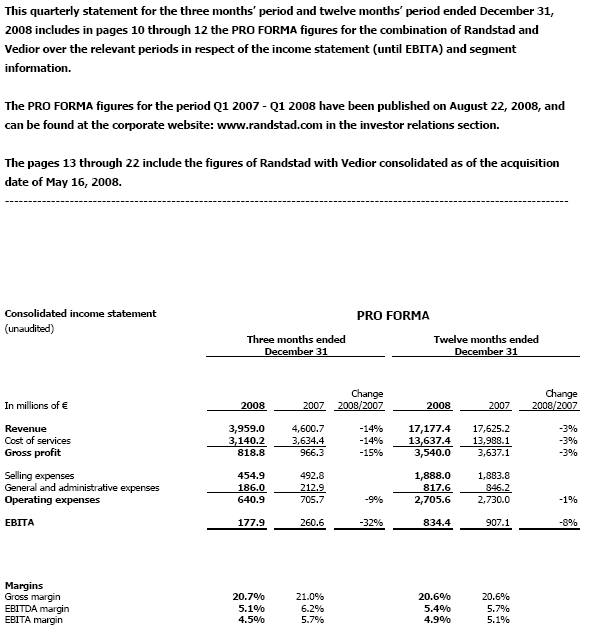
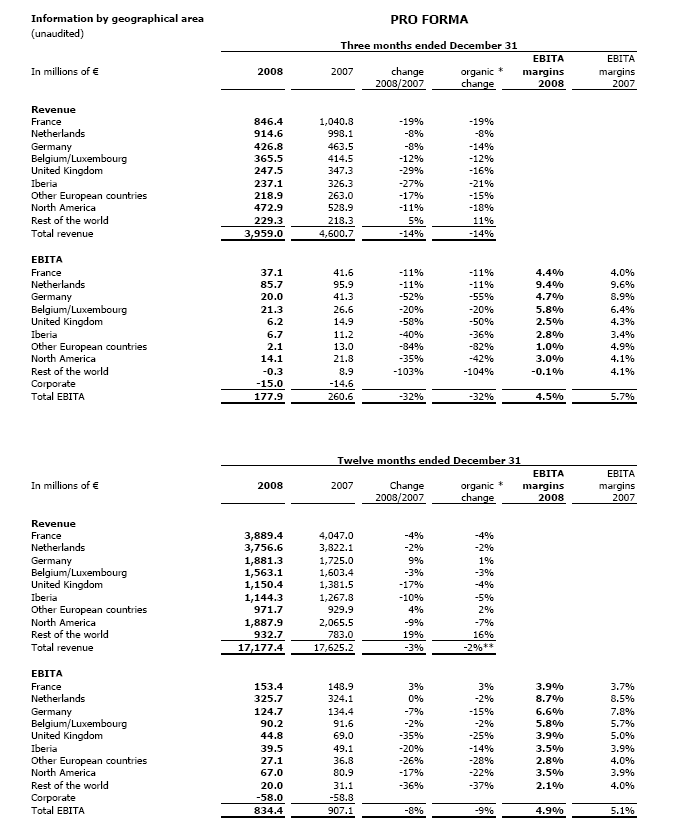
* Organic change is measured excluding the impact of currency effects, acquisitions and disposals.
** In Q3 2008 the YTD organic revenue growth percentages were not all correct. The correct figures are: Germany 7% (instead of 10%), Other European countries 9% (instead of 11%), Rest of World 18% (instead of 27%) and Total revenue 2% (instead of 3%). The revenue figures themselves were correct.
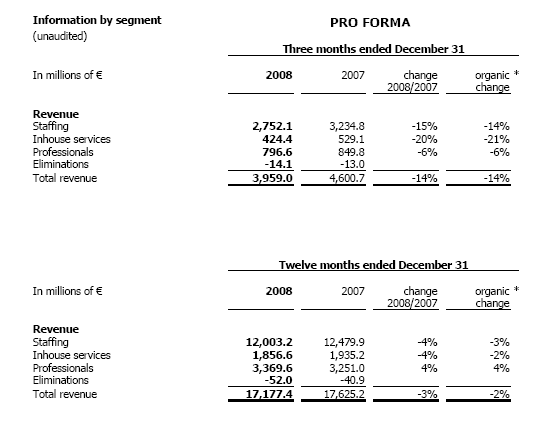
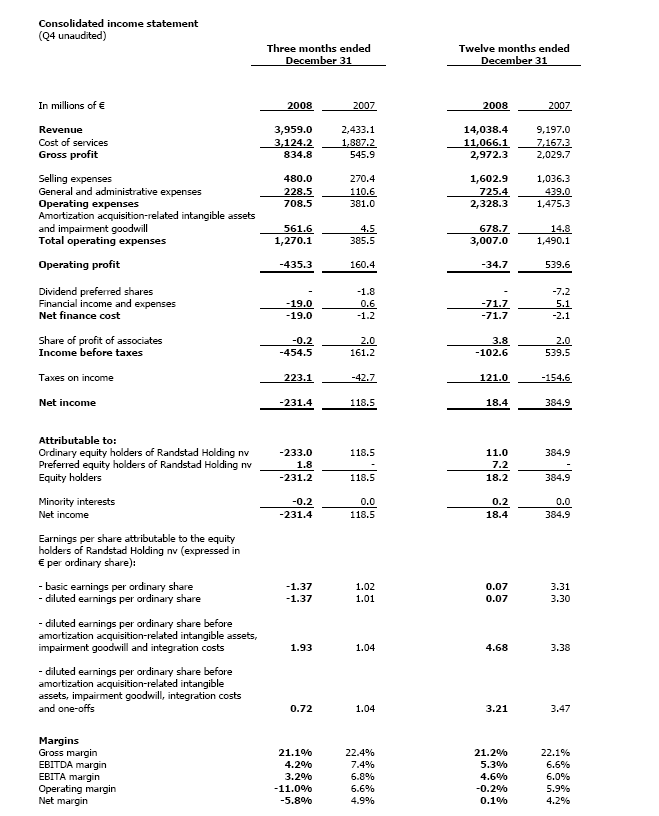
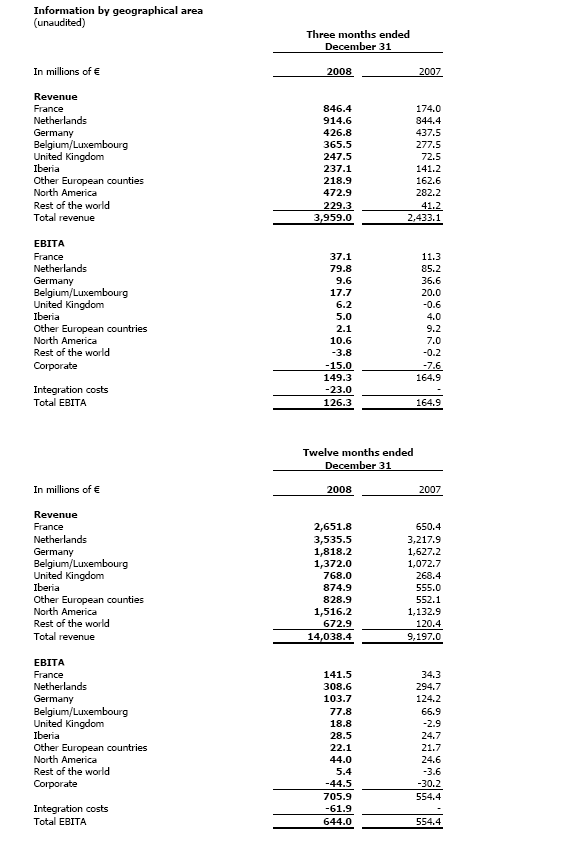
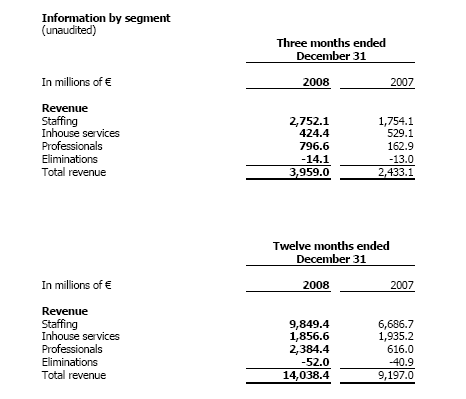
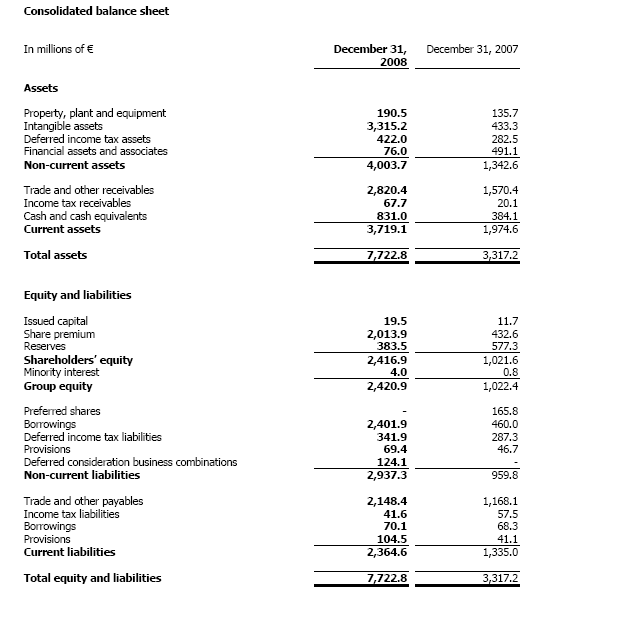
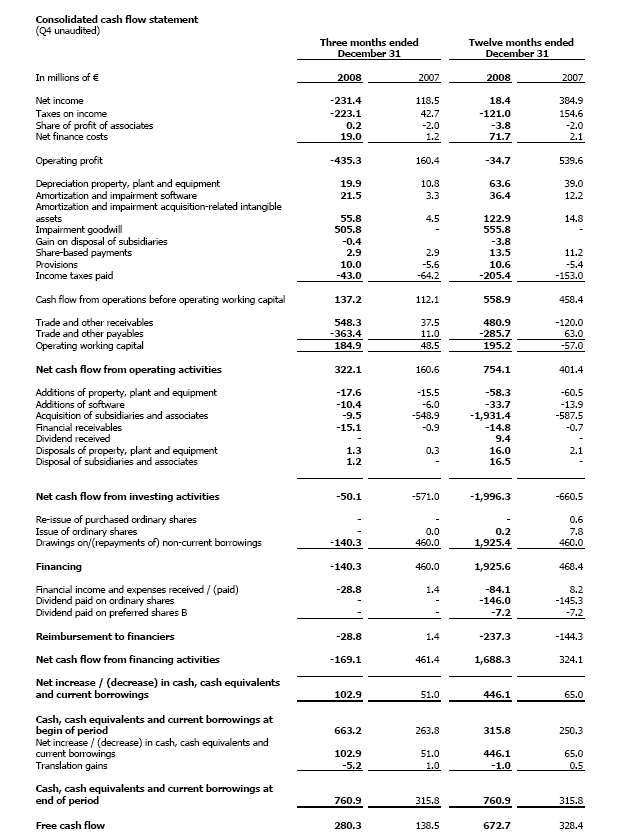
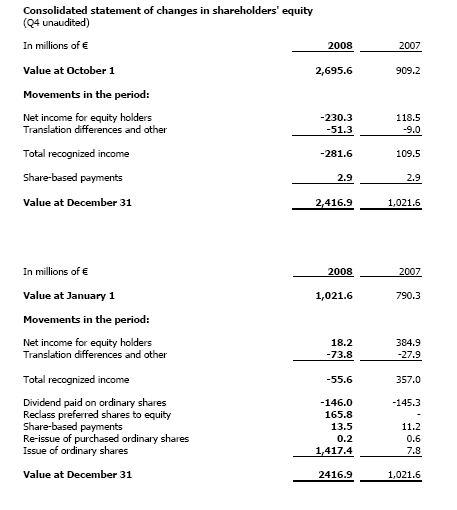
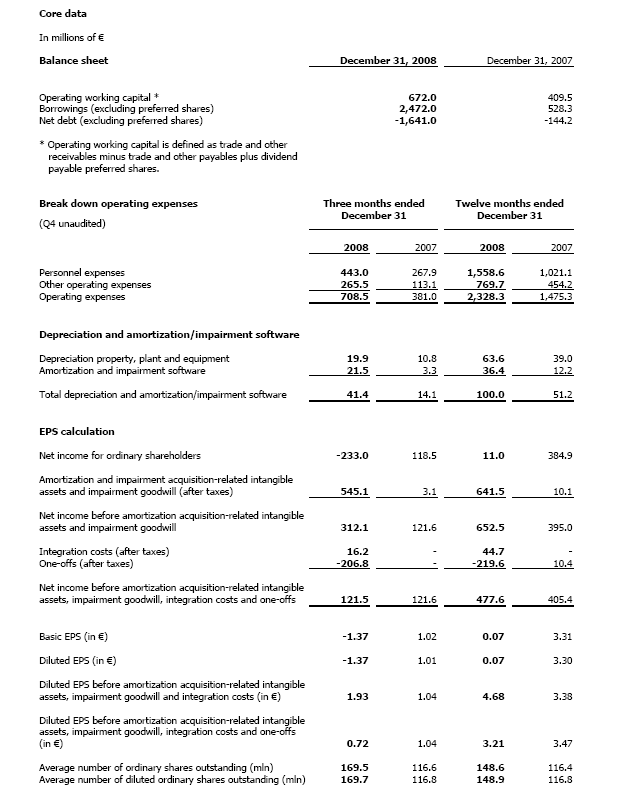
Notes to the consolidated interim financial statements
Reporting entity
Randstad Holding nv is a public limited liability company incorporated and domiciled in the Netherlands and listed on Euronext Amsterdam.
The consolidated interim financial statements of Randstad Holding nv as at and for the three and twelve months' period ended December 31, 2008 include the company and its subsidiaries (together called the 'Group').
Significant accounting policies
These consolidated interim financial statements have been prepared in accordance with International Financial Reporting Standards and its interpretations issued by the International Accounting Standards Board (IASB), as adopted by the European Union (hereafter: IFRS).
The accounting polices applied by the Group in these consolidated interim financial statements are unchanged compared to those applied by the Group in its consolidated financial statements as at and for the year ended December 31, 2007.
Basis of presentation
These consolidated interim financial statements are condensed and prepared in accordance with (IFRS) IAS 34 'Interim Financial Reporting'; they do not include all of the information required for full (annual) financial statements, and should be read in conjunction with the consolidated financial statements of the Group as at and for the year ended December 31, 2007.
The consolidated financial statements of the Group as at and for the year ended December 31, 2007 are available upon request at the Company's office or at www.ir.randstad.com.
Estimates
The preparation of consolidated interim financial statements, requires the Group to make certain judgments, estimates and assumptions that affect the application of accounting policies and the reported amounts of assets, liabilities, income and expenses. Actual results may differ from these estimates.
In preparing these consolidated interim financial statements, the significant judgments, estimates and assumptions, were the same as those applied to the consolidated financial statements as at and for the year ended December 31, 2007.
Seasonality
The Group's activities are impacted by seasonal patterns. The volume of transactions throughout the year fluctuates per quarter, dependent upon demand as well as variations in items such as the number of working days, public holidays and holiday periods. Historically, the Group usually generates its strongest revenue and profits in the second half of the year. Historically, in the second quarter cash flow
